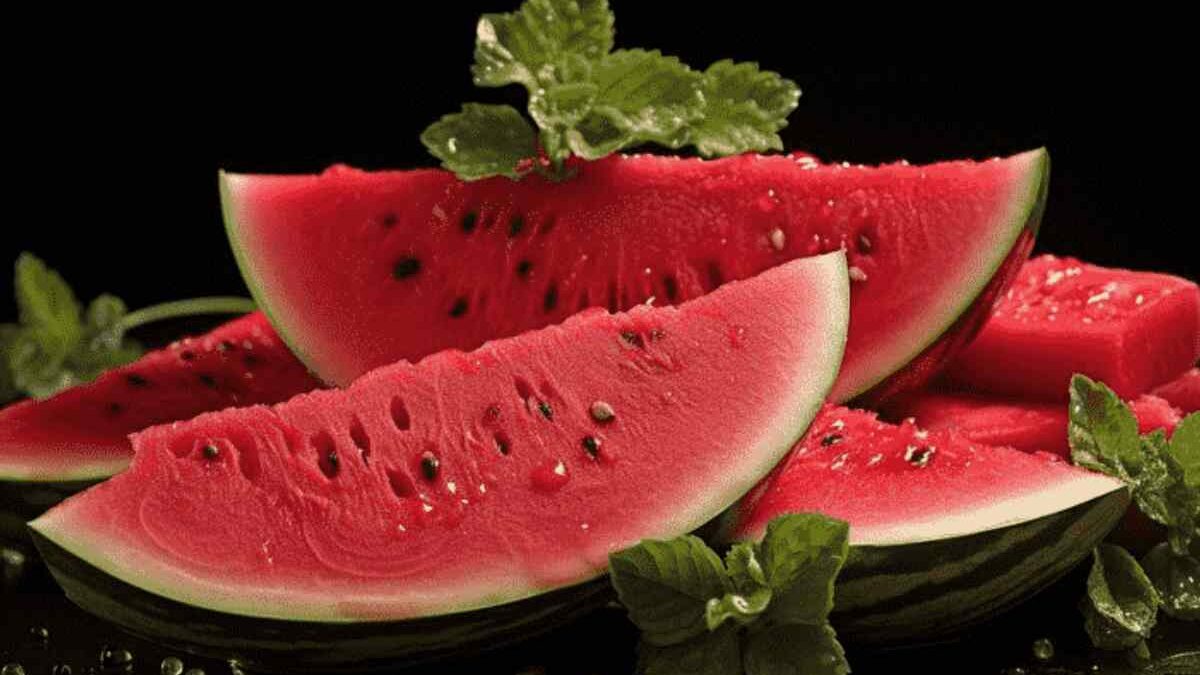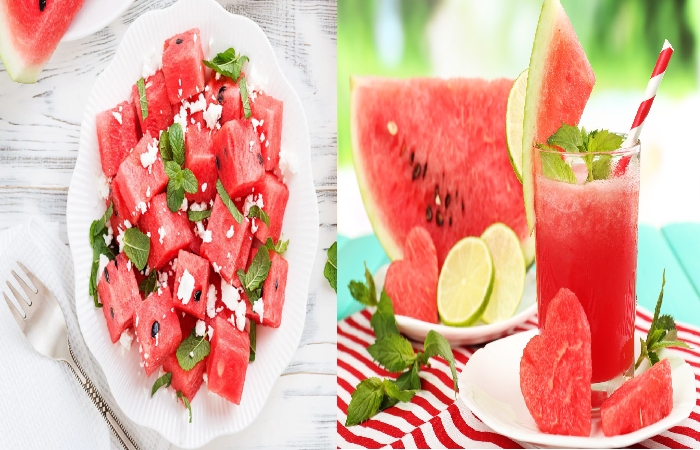Table of Contents
Watermelon – Known
Watermelon is a deliciously healthy fruit, soaked with nutrients, low in calories and is free of fat. You can eat all shares of the watermelon, counting the rind and seeds, affording to the health website Healthline. Watermelon is good for you when consumed in reasonable amounts and provides many health benefits.
“Foods that are tall in antioxidants and amino acids let your figure function optimally,” said Angela Lomond, a Texas-based registered dietitian, nutritionist and representative for the Academy of Nutrition and Dietetics. “Amino acids are the basic structure block for protein, and protein in virtually every vital function in the body.”
Watermelon Healthy Benefits
Watermelon Lycopene is a phytonutrient, an active compound in fruits and vegetables that works with the human body to trigger healthy reactions. The red colour also gives watermelons, tomatoes, red grapefruits and guavas their colour. Watermelon contains some of the highest lycopene stages of any fresh fruit. Bestowing to the U.S. Department of Agriculture, a cup then a half of watermelon contain about 9 to 13 milligrams of lycopene — 40% more lycopene than raw tomatoes.
To maximize your lycopene intake, you need to let your watermelon fully ripen. The redder your watermelon becomes, the higher the attention of lycopene develops. Beta-carotene and phenolic antioxidant content also grow as the watermelon ripens. “Beta carotene is an antioxidant created in red-orange fruits and vegetables. It supports with protection, skin, eye and the deterrence of cancer,” said Lomond.
However, that doesn’t look unkind. The red portions are the only good ones. “All parts of the watermelon are good. This includes the white flesh nearest the peel, which covers extra of the amino acid citrulline than the flesh, according to a 2005 study in the Journal of Chromatography.
Watermelon Citrulline is a valuable amino acid that changes to the amino acid arginine. According to explore at Texas A&M University, these amino acids promote blood flow, which leads to cardiovascular health, improved circulation, and even conduct for erectile dysfunction, according to research at Texas A&M University.
New studies have also found that watermelon seeds are wonderfully nutritious, especially if sprouted and shelled. Affording to an analysis by the International Journal of Nutrition and Food Sciences, they are high in protein, magnesium, vitamin B, and good fats.
Watermelon Heart Health and Anti-Inflammables Benefits
Watermelon The high levels of lycopene in watermelon effectively protect cells from damage. According to a study at Purdue University. They may help lower the risk of heart disease. A study in the American English Journal of Hypertension created that watermelon extracts helped reduce hypertension and lowered blood pressure in obese adults.
Watermelon may also be particularly important for older women. A study available in Menopause found that postmenopausal women. A group is known to have increased aortic stiffness. Who took watermelon excerpt for six workweeks saw decreased blood pressure and arterial stiffness compared to those who did not take watermelon extract. The novelists of the education attributed the benefits to citrulline and arginine.
Arginine can help advance blood flow and may help reduce the accumulation of excess fat.
“The lycopene in watermelon brands it an anti-inflammatory fruit,” Jarzembowski said. Lycopene is an inhibitor for numerous inflammatory procedures and works as an antioxidant to neutralize free radicals. Moreover, the watermelon contains choline. Which helps keep chronic inflammation down, according to a 2006 article published in Shock medical journal.
Reducing inflammation isn’t just suitable for people who have stiffness. “When you’re sick, you have a cellular injury, which can occur by a variety of factors including stress. Smoking, pollution, disease and your body develop inflamed. In this way. Anti-inflammatory foods can assist with complete protection and overall health.
Watermelon Other Benefits and Cancer Anticipation
“Watermelons help with general hydration, and that is a great thing,” said Lomond. “They say we container get 20-30 per cent of our fluid needs through our diet alone. And foods like these certainly help.” Additionally, their juice is full of suitable electrolytes. This can even help prevent heatstroke.
The watermelon also contains fibre, which encourages a healthy digestive tract and helps keep you regular.
ACCORDING TO THE CLEVELAND CLINIC, Vitamin A helps save skin and hair moisturized, and it also encourages the healthy growth of new collagen and elastin cells. Vitamin C is also helpful in this regard. As it endorses healthy collagen development. Vitamin A is also excellent for your skin. And just a cup of watermelon contains nearly one-quarter of your recommended daily intake.
Like other fruits and vegetables, watermelons may help reduce cancer risk through their antioxidant properties. In particular rendering to the National Cancer Institute. lycopene has been linked to reducing prostate cancer cell proliferation.
Watermelon Have Side Effects
Despite its multiple health benefits here are some disadvantages to overeating watermelon.
May cause Digestive Issues
watermelon may cause abdominal discomfort bloating. Gas and diarrhoea due to its high FODMAP content. Nutritionists think watermelon is a high FODMAP food because of its fructose satisfaction. Fructose is a monosaccharide — or a humble sugar — that may cause bloating or discomfort when spent in large amounts.
While watermelon’s high FODMAP status may designate its reasons. Digestive issues among fructose-sensitive people. You shouldn’t expect a stomach ache every time you eat a large serving. Still, those who suffer from IBS may experience poverty eating watermelon more frugally.
May raise your blood sugar levels
In addition to its high FODMAP content. Therefore, overdoing watermelon may raise your blood sugar levels, which you should be particularly mindful of if you have diabetes.
The GI of food measures its effects on your blood sugar during 2 hours. High GI nutrients tend to point your blood darling levels. Although low GI foods yield a steady.
Foods secret as low GI have a GI level under 55. Those deemed to be medium GI range from 56–69. and high GI foods are over 70. Watermelons have a GI of 72–80.
Nevertheless, the GI may indicate how your blood sugar. Reacts to a specific carb-containing food. The glycaemic load (GL) considers the serving size.
As such, The GL inclines to be an exact extra measure of a food’s. Effect on your blood sugar levels.
The GL index also categorizes foods into low Medium or high. A count of less than ten is considered low, 11–19 is medium, and over 20 is considered high.
By a GL of 5–6 per cup (152 grams), watermelons are classified as a low GL food — meaning that nevertheless of their high GI position, a small. 1-cup (152-gram) helping won’t cause any harm (11)
However, overdoing watermelon will grow its GL. Most likely leading to a spike in your blood sugar heights.
Watching your blood sugar is particularly important if you have diabetes.
May lead to orange discolouration of the skin
Although rare, one study determined that overeating. Watermelon may help with a yellow-orange discolouration of the skin called glycaemia. A variant of carotenemia.
Lycopene is together an antioxidant and a pigment. And then it’s accountable for the characteristic red colour of watermelons and extra fruits and vegetables.
If consumed in excess. lycopene may shape up in your skin’s outer deposits and alter your skin pigmentation. However, the education didn’t indicate how much was too large watermelon in this case.
Fortunately, lycopenodermia is a rare condition that’s entirely reversible. Its effect on your skin can be reducing heavy intake of lycopene-rich foods.
Conclusion
Fruits are an essential share of a healthy diet, with vitamins, minerals, and beneficial antioxidants.
Watermelon is an excellent source of vitamins A and the antioxidant lycopene, which is r for its cancer-fighting properties and cardiovascular health.
However, you may be cautious of overeating fruit. Overeating everything — including fruits — may come with a couple of unwanted side properties.
This article attaches the side of overeating watermelon and dispels certain myths about watermelon’s impact on your diet.


